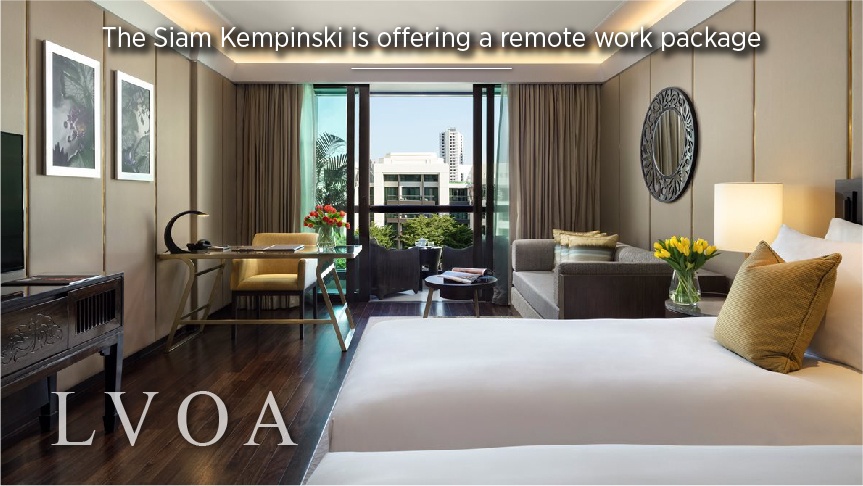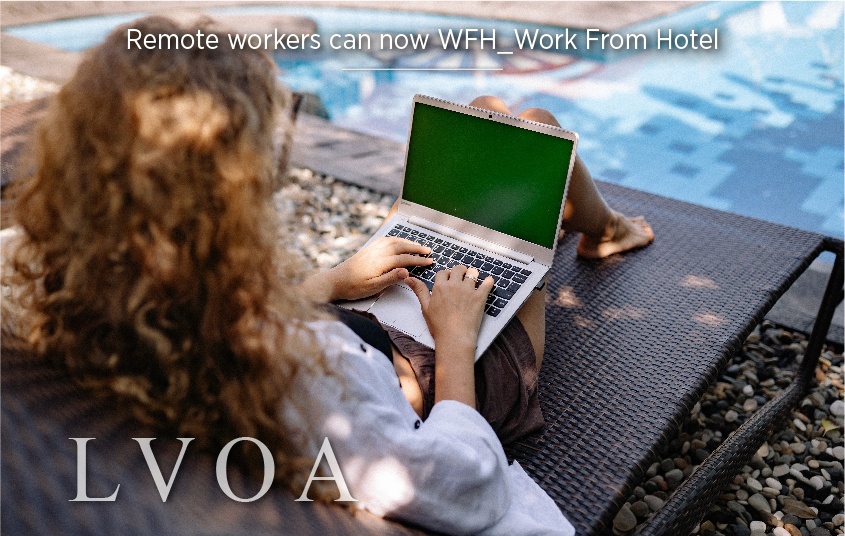Are you tired of working from home? Sure, the commute is great, but it’s hard to switch off in the evenings and to concentrate solely on work during the day, especially if you have a family. The monotony of the same surroundings day in and day out are wearing on us all, and aren’t exactly motivating or conducive to creativity.
Enter the WFH stay: an acronym that stands for “Work From Home” but could equally mean “Work From Hotel.” This staycation solution is a hotel concept that breaks up the boredom of the home office by offering a work-focused hotel stay, while creating new opportunities for the flailing hotel industry.
What is a WFH hotel stay?
A WFH hotel package provides an affordable rate for a guest room in which to work, sometimes even just for half a day. Other typical benefits include access to hotel facilities such as the pool and gym; refreshments like tea or coffee, and sometimes F&B perks; as well as the most important of all amenities – high-speed WiFi.
WFH hotel packages in Bangkok
Bangkok’s abundance of hotels, combined with encouragement from government authorities to keep employees working from home, has led to a range of WFH packages becoming available here in the capital. Here are just a few examples:
A “Work From Hyatt” package at the Grand Hyatt Erawan Bangkok starts at THB1,231++ for half a day, 7am to 7pm. This includes access to hotel facilities (pool, gym, well-equipped business center with printing, copying and scanning services), 15% discount off F&B, complimentary water and hot drinks, plus parking.
The Holiday Inn is even more affordable, with rates starting at THB700 for a half-day WFH package. This includes free tea and coffee, complimentary use of the pool and gym, as well as discounts on F&B at the Orchid Lounge. The full-day package comes with a Thai set lunch.
On the more luxurious end of the scale, the five-star Siam Kempinski’s remote work package starts at THB3,555 per room per person for 12 hours, 7am to 7pm. This includes a three-course set lunch from the ALATi Mediterranean restaurant concept and an in-room minibar with coffee, tea, soft drinks and snacks.
WFH hotel packages around the world
Elsewhere around the world, WFH hotel packages are cropping up everywhere from the United States to India.
The beachside Kimpton Surfcomber Hotel in Miami has received a lot of media attention for its comprehensive WFH package, with perks such as unlimited morning coffee (8 am to 10 am), 20 pages of black and white printing, a mini office kit with stationary, a poolside cabana for every night of the stay, complimentary daily wine hour (5 pm to 6 pm), discounts on valet parking and F&B, a waived USD41 resort fee, plus the resort is pet-friendly. Rates start at USD109 per night.
The history of working from hotels
Technically, working from hotels is not a new trend. Business hotels are already designed for the working traveller, while business centers are common fixtures in many hotels, as are in-room desks and decent WiFi.
Before modern technology, working from hotels was commonplace for creatives, particularly writers. Maya Angelou was known to rent a hotel room and use it solely as a writing space, keeping the sheets unchanged and paying by the month. Ernest Hemingway started writing For Whom the Bell Tolls while living at Hotel Ambos Mundos in Havana. Playwright Tennessee Williams lived in the Hotel Elysée in New York for 15 years and wrote many of his works in his suite, allegedly keeping other guests awake with his late-night typing!
Here in Bangkok, the Mandarin Oriental has a long legacy of famous writers as guests: Joseph Conrad, Somerset Maugham, John LeCarre, Graham Greene, Barbara Cartland and Thai writer Momrajawong (M.R.) Kukrit Pramoj – as the latter was a Bangkok native, he was obviously on a staycation.
Con: Complacency
It’s important to remember that the vaccine does not prevent recipients catching or spreading the virus, it only reduces the severity of the disease. Therefore the same hygiene standards and precautions should be in place, such as wearing masks. A recent negative Covid-19 test is still needed to check that a traveller does not carry the virus.
What’s more, the vaccine diminishes symptoms, therefore it’s more difficult to tell if you have the virus, so arguably we should all be even more cautious at a time when it’s tempting to be more lax.
The digital nomad trend
Remote work was already on the rise pre-Covid, especially among the “digital nomad” crowd with its philosophy of working and travelling at the same time. After all, if all you need is a WiFi connection, then much of the world can be your office.
Now compounded by the fact that many of us have realised we can do our jobs just as well at home as in a physical office space, thanks to pandemic-induced lockdowns, it’s likely that the remote work trend will continue to rise both in the short and long term.
This is influencing other aspects of the travel industry. For example, countries such as Estonia, Antigua & Barbuda, Barbados, the UAE (Dubai), Georgia, Croatia, Mexico, Costa Rica and many more are introducing special visas for remote workers.
Hybrid hospitality
Then, there’s the rise of hybrid hospitality, which mixes hotel accommodation with workspaces, both private meeting rooms and co-working areas, into a lifestyle hotel concept. Work and leisure are balanced, while guests mix with locals in communal work areas and through community-minded events.
One brand that has pioneered this idea is Zoku, an award-winning European hotelier that has created something of a new industry genre in their home-office properties, which are suitable for long stays and selected for their location within a buzzing neighbourhood. The newest addition, Zoku Copenhagen, opened in May 2021 and marked the brand’s first property outside of the Netherlands; comprised of 160 cosy lofts with fully-equipped kitchens, an alcove with office supplies and the option of hanging your own artwork on the walls.
The pandemic has blended work and home together both physically and mentally, but the truth is that this merging of home, office and hospitality has long been in action. As the hospitality industry adapts and becomes flexible to what guests need in recovery from Covid-19, it will be interesting to see how the shift from traditional hotel to multi-faceted lifestyle hotel concept plays out.








